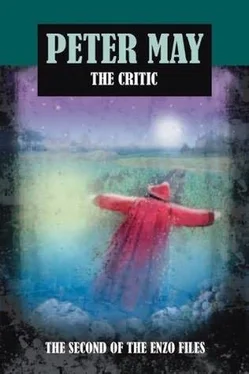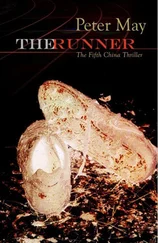Peter May - The Critic
Здесь есть возможность читать онлайн «Peter May - The Critic» весь текст электронной книги совершенно бесплатно (целиком полную версию без сокращений). В некоторых случаях можно слушать аудио, скачать через торрент в формате fb2 и присутствует краткое содержание. Жанр: Классический детектив, на английском языке. Описание произведения, (предисловие) а так же отзывы посетителей доступны на портале библиотеки ЛибКат.
- Название:The Critic
- Автор:
- Жанр:
- Год:неизвестен
- ISBN:нет данных
- Рейтинг книги:5 / 5. Голосов: 1
-
Избранное:Добавить в избранное
- Отзывы:
-
Ваша оценка:
- 100
- 1
- 2
- 3
- 4
- 5
The Critic: краткое содержание, описание и аннотация
Предлагаем к чтению аннотацию, описание, краткое содержание или предисловие (зависит от того, что написал сам автор книги «The Critic»). Если вы не нашли необходимую информацию о книге — напишите в комментариях, мы постараемся отыскать её.
The Critic — читать онлайн бесплатно полную книгу (весь текст) целиком
Ниже представлен текст книги, разбитый по страницам. Система сохранения места последней прочитанной страницы, позволяет с удобством читать онлайн бесплатно книгу «The Critic», без необходимости каждый раз заново искать на чём Вы остановились. Поставьте закладку, и сможете в любой момент перейти на страницу, на которой закончили чтение.
Интервал:
Закладка:
She closed her eyes and thought again about kneeling in the abbey the previous night, praying for a quick and painless departure. She could not help wondering, irrationally, as she had through all the long drive from Gaillac, if she was somehow responsible for her mother’s death.
They walked in silence together up to the old abandoned farmhouse, past the piles of logs heaped up along the track, canvas covers whipping and billowing in the wind. Cloud had obliterated the sun. They could see the rain now, sweeping across the distant hills like a fog. Lightning flashed across the horizon, and they heard the far-off rumble of thunder. They stopped to watch for a moment, knowing that it was only a matter of minutes before the rain would reach them.
Her father scratched his head with fingers that were black from harvesting walnuts. ‘Can’t do it on my own,’ he said.
Nicole turned her face up to look at him, puzzled.
‘Do what, Papa?’
‘Run the farm. With Marie gone…I can’t do it on my own.’
Nicole sighed. Her mother had done so much on the farm, as well as keeping house, cooking for them, doing the laundries. Her father was right. There was no way he could do it all himself. ‘Can’t you get help?’
He shook his head and avoided her eye. ‘Can’t afford it.’ He was silent for a long time. Perhaps it was only the first spots of rain blowing in their faces that precipitated his final confession. ‘See, it was always a struggle, Nicole. Putting you through university. Paying your digs in Toulouse.’ He turned big, sad, guilty eyes to meet his daughter’s. ‘Can’t do it and pay someone to help. You’ll need to come home. Take your mother’s place.’
Chapter Sixteen
I
‘Cryptography,’ Enzo said. ‘From the Greek. Kryptos, meaning hidden, and grafo, meaning to write. Once described by the cryptographer Ron Rivest as being all about communication in the presence of adversaries.’
He set himself tipping back and forth in the rocking chair, all the while gazing thoughtfully at his whiteboard. In his hand he clutched the tasting notes of old Jacques Domenech. He was looking for a starting point.
Michelle sat on the stairs, a half-drunk glass of red wine on the step beside her. She pulled her knees up under her chin, arms hugging her shins, and stared at the code her father had created. She had no idea where to even begin to try to break it. Sophie had taken Nicole’s place at the computer. Bertrand stood behind her, a glass of wine in his hand, pointing and prompting as she pulled up different sites on the internet.
‘Wikipedia,’ he said, and she tapped some more.
‘Okay.’ She read aloud. ‘One of cryptography’s primary purposes is hiding the meaning of messages. Not usually the existence of such messages.’ She puffed up her cheeks and blew through her lips. ‘Talk about stating the obvious.’
‘No, no.’ Enzo interrupted her. ‘The obvious is what we so often miss. So it does no harm to state it.’
Sophie’s fingers rattled over the keyboard, annoyed at being put down by her father in front of Michelle. ‘Here’s a book called Between Silk and Cyanide,’ she said. ‘About code-breaking during the Second World War.’
‘I’ve read it,’ Enzo said. ‘Agents used poems they’d written themselves as the basis for their codes.’ He grinned. ‘There was no way the Germans could possibly guess the next line in a piece of doggerel which began, “Is de Gaulle’s prick twelve inches thick?”’
‘Papa, that’s disgusting!’
‘That was the point. The more crude or absurd, the more impossible for someone else to crack it.’
‘It doesn’t sound like my father,’ Michelle said.
Enzo nodded his agreement. Petty, it seemed, had been a pretty humourless individual. ‘But in any case, he wouldn’t have needed to make his code that difficult. He was guarding against accidental discovery. I don’t think he ever imagined that anyone would be making a concerted effort to break it. I guess it was almost like a kind of shorthand. More for himself than anything else.’
‘Did your father speak another language?’ Bertrand glanced towards Michelle.
‘French. Some Spanish. I don’t think he was particularly fluent in either.’
Sophie looked up at the board. ‘oh, nm, ky, ks is not French. It’s not like any kind of Spanish I’ve ever seen either.’
‘No, but it’s a good thought,’ Enzo said. ‘What’s another language, except another set of words for the same thing? A French-English dictionary, for example, is just two lists of corresponding words, one of which is alphabetical.’
‘I see what you mean.’ Michelle lifted her glass and sipped pensively. ‘So you think my dad just made a list of the terms he uses to describe wines, and set them against another list of some kind.’
‘A poem, maybe?’ Sophie chipped in. ‘The first and last letters of each word.’
‘I doubt it.’ Enzo shook his head. ‘Too complicated. It would have to be something he could remember quite easily, without reference to something written.’ He caught Sophie glaring at him and felt a stab of guilt at having dismissed her so easily. ‘But it’s a good thought.’
The damage, however, had been done. Sophie confined her frustration to a single, audible tut. She turned back to the computer and the chatter of the keyboard reflected her annoyance as she typed another search into Google. Her eyebrows shot up in sudden surprise and she looked at Michelle. ‘Did you know your dad’s website’s still up on the net?’
Michelle shrugged. ‘There wouldn’t have been anyone to remove it. I guess there are probably thousands of websites out there belonging to dead people.’
Bertrand stabbed a finger at the screen. ‘There. What’s that?’
Sophie peered at the screen. ‘It’s a link to something called a taste wheel. What the hell’s a taste wheel?’
Michelle said, ‘It’s a wheel divided into flavour segments. Just a graphic representation of tastes and smells. It was the department of enology at UC Davis that first came up with the concept. My dad published his own version of it in a book he wrote about wine tasting.’
Sophie clicked the mouse and waited a moment. ‘And he put it right up here on his website.’
Enzo eased himself out of the rocker and rounded the table to have a look. The wheel was divided into multicoloured segments. An inner wheel was separated into the ten perceived categories of taste and smell, the largest of which was Fruit. It then ranged through Sweet, Wood, Spice, Savoury, Herbal, Floral, Nutty, Mineral, and Dairy, which was the smallest. Each category was allotted a different colour, subdivided through the outer wheel into individual flavours represented by tonal variations of that colour. Fruit was split into red and green and went from apple, pear, and lemon, through to prune, fig, and jam. Spice was pink and included tobacco, smoke, and liquorice; while Dairy, which was yellow, comprised only butter and cream. In all, there were sixty-four flavours.
Enzo shook his head and marvelled at the smells and flavours people were able to discern in wine. Ground coffee. Leather. Cut grass. Toast. Stones. And yet, they were all things he had perceived himself in one wine or another over the years. Violets, cherries, grilled nuts. Some were appealing, others less so. Earth, green pepper, petrol. He screwed up his face at the very thought.
Bertrand said, ‘Look, he also lists the words he used to describe the sensual qualities of wine in the mouth.’ He pointed to an alphabetical list of seventeen words below the wheel. They went from Astringent, describing mouth-puckering tannins, through Firm, Heavy and Sharp, to Thin, representing a lack of flavour and body.
Читать дальшеИнтервал:
Закладка:
Похожие книги на «The Critic»
Представляем Вашему вниманию похожие книги на «The Critic» списком для выбора. Мы отобрали схожую по названию и смыслу литературу в надежде предоставить читателям больше вариантов отыскать новые, интересные, ещё непрочитанные произведения.
Обсуждение, отзывы о книге «The Critic» и просто собственные мнения читателей. Оставьте ваши комментарии, напишите, что Вы думаете о произведении, его смысле или главных героях. Укажите что конкретно понравилось, а что нет, и почему Вы так считаете.












